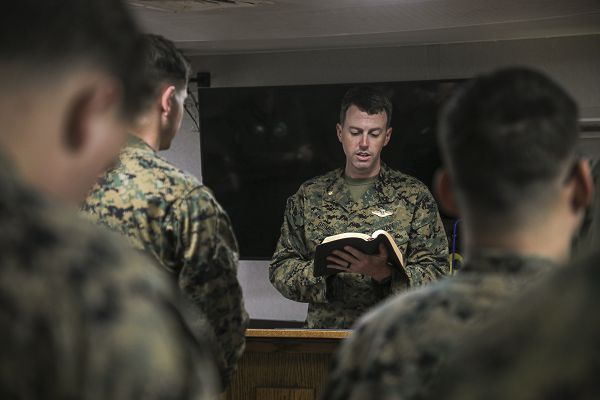
Pacific Ocean. (December 24, 2023): When we think of a military chaplain, we see a fearless man streaking from foxhole to foxhole caring for dying men while totally disregarding his own safety. Today, chaplains provide just as important a role as counselor/confessor to the troops. In this photo by Corporal Carl Matthew Ruppert, Navy Lieutenant Commander Austin Grimes, a chaplain with 13th Marine Expeditionary Unit, leads a chapel service aboard the amphibious assault ship USS Makin Island. American troops know that no matter what branch or where you serve, there will be a highly trained and experienced chaplain as a confidant should they need it.
Chaplains have accompanied military units since the Continental Army during the American Revolution and their mission continues to be to tend to the spiritual needs and moral well-being of unit members and their families.
Besides their traditional duties conducting worship services, today’s chaplains help commanders deal with work-related issues, particularly the stress of deployments on marriages and families. Although not licensed clinical counselors, military chaplains adhere to absolute confidentiality and are prepared to help people with many life challenges including marital problems, substance abuse, and financial difficulties typically faced by young servicemembers. Commanders’ view chaplain services as a crucial way to relieve stress and maintain harmony in the ranks.
Today, there are some 1,300 active-duty Army chaplains and 1,200 in the reserve components, representing five major faiths groups (Catholic, Protestant, Jewish, Muslim, and Buddhist) and over 120 denominations, administer to soldiers and their families.
America’s military will continue to tend to the religious and spiritual needs of the troops by giving commanders the religious and spiritual support they need.


